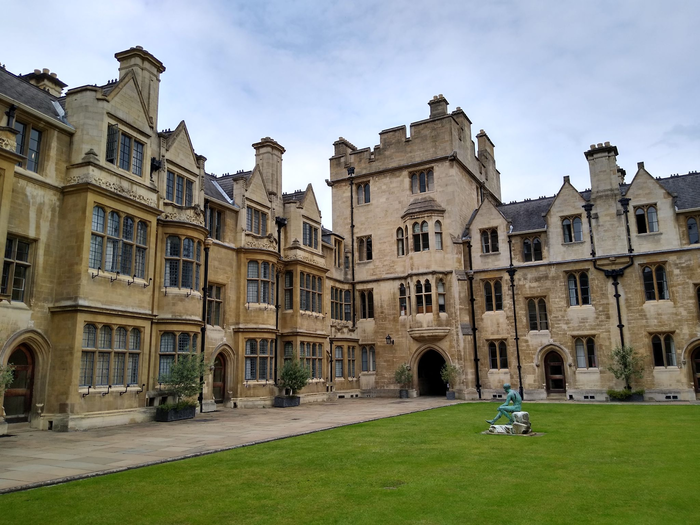#SpeakOut: SU supports standardisation of intercollegiate discrimination complaints policy
The motion emphasises that the University ‘must do more…in the mishandling’ of discrimination

Content Notice: This article contains discussion of racial discrimination and disciplinary practices
The Cambridge Students’ Union (SU) has this evening (01/03) voted in recognition of an emergency motion to support an open letter entitled ‘#SpeakOut: Open Call for Cambridge to Standardise Misconduct and Discrimination Reporting Systems Across its Constituent Colleges’.
The open letter was initiated by Gregory Serapio-García, a PhD student who was the subject of a Huffington Post investigation last month which claimed that he faced discrimination from a porter at Trinity College.
The report claimed that, while Serapio-García was delivering care packages to isolating students at Trinity College, he was stopped by a porter who was “hostile” towards him and claimed not to understand what he was saying.
According to Serapio-García, the porter spoke to him in a “raised voice” upon being asked about the students’ pigeonholes, saying “Trinity College do not have pigeonholes. Who exactly are you? Who authorised this?”, Serapio-García considered the incident to be an act of “racial antagonism”.
The SU released a statement at the time of the Huffington Post investigation, arguing that the “complaints system in its current form is not fit for purpose”, and that in order to “back up their stated commitments to building a welcoming and nurturing community for students from all backgrounds [...] Cambridge Colleges must go further.”
The open letter proposes “bold and timely reforms” to help “Cambridge [...] signal to the world that the responsibility of fighting discrimination and inequality can and should be the responsibility of all.”
The letter considers the University’s mechanisms for dealing with discrimination and harassment to be “woefully inadequate”. It also highlights that the “the fact that individuals are expected to draft and file a grievance independent of any formal third-party advocacy...actively deters victims from coming forward with complaints.”
It emphasises that the “countless minoritised students” writing in the press about their experiences “signal[s] a recurring pattern of unstemmed misconduct—a pattern plainly symptomatic of an archaic Collegiate structure which [is considered] ill-equipped to handle misconduct, discrimination, and harassment in its many visible and invisible forms.”
The letter proposes several reforms to the University’s regulations for handling discrimination, which Serapio-García hopes will be enacted by the University via a Grace at Regent House. Among these proposals is a call on Colleges to “resolve such complaints...within twenty-one calendar days of receipt.”
In Serapio-García’s case, Trinity reportedly took almost five weeks to conduct an investigation after his initial complaint and the student has previously told Varsity that 130 days on from the incident for him the case was not resolved.
The letter also calls for the creation of “an intercollegiate Discrimination Accountability, Reporting, and Transparency System (DARTS) obligating Colleges to record and transmit anonymised statistics and progress metrics related to allegations of direct and indirect discrimination, harassment, and victimisation to a central regulatory body.”
With 95% of tonight’s (01/03) vote in favour of the motion, 0% in opposition and a 5% abstention rate, the SU will subsequently resolve, among other measures, to co-sign, both individually and as an organisation, the open letter’s proposal “to standardise misconduct reporting and response requirements across Cambridge’s constituent Colleges”.
The SU will also collaborate with the University of Oxford’s Student Union “to build a broader coalition of support”, produce and distribute digital promotional materials, tweets and statements to support the proposal and lobby University leadership for endorsement. It will also monitor and report internally on “the progress of the proposal through the University governance process.”
In the motion, the SU said it believes that the “largely decentralised and unrestricted freedom to handle cases of assault, discrimination, and harassment at their own discretion allows our wider University to defer responsibility to and hide behind archaic Collegiate formalities when dealing with serious allegations of College-level misconduct”. According to the SU, the University “must do more in its power to hold its constituent Colleges accountable in the mishandling of such cases.”
The SU’s BME and Women’s campaigns will also be holding a joint open meeting tomorrow (02/03) on reforming the University’s disciplinary procedures.
 News / Eight Cambridge researchers awarded €17m in ERC research grants27 December 2025
News / Eight Cambridge researchers awarded €17m in ERC research grants27 December 2025 News / Clare Hall spent over £500k opposing busway 24 December 2025
News / Clare Hall spent over £500k opposing busway 24 December 2025 Comment / League tables do more harm than good26 December 2025
Comment / League tables do more harm than good26 December 2025 News / Caius mourns its tree-mendous loss23 December 2025
News / Caius mourns its tree-mendous loss23 December 2025 Comment / The ‘class’ of Cambridge24 December 2025
Comment / The ‘class’ of Cambridge24 December 2025











